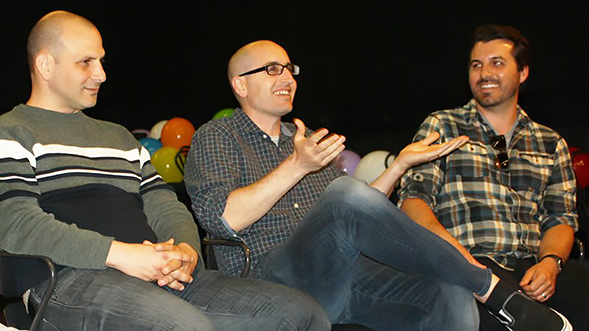Believing in Yourself
SDSU Television, Film and New Media alumni spoke with students considering careers in television and film.

Ron Najor (’99, ’02), Justin Halpern (’03) and Mike Rizzi (’03) know what it takes to succeed in the entertainment industry. The three San Diego State University alumni periodically return to campus to speak with students interested in television and film careers.“I really like to come back and tell people there is light at the end of the tunnel.”
At a visit to the Experimental Theatre with three dozen students from SDSU’s Television, Film and New Media (TFM) program two months ago, the trio shared stories of the perils and pitfalls of making a career move to Los Angeles. Insightful, cautionary, and most often funny, their anecdotes and reflections from their personal experiences provided an entertaining as well as informative lesson for the young audience.
Halpern is an author, screenwriter and producer whose career took off after a twitter handle he maintained turned into a best-selling book that became the TV series “S#*T My Dad Says” starring William Shatner. He has recently been working as a showrunner on NBC’s superhero series “Powerless.”
A television writer for the past eight years, Halpern waited tables for six years while trying to land a steady writing position in which he could earn a steady paycheck. He worked nights so he could hone his writing skills during the day while he continued pursuing his first big break.
“I really like to come back and tell people there is light at the end of the tunnel," he said of his SDSU visit. "I hope (students) walk out with the idea that it's a daunting task to go out to LA and make it and make a living, but that it's possible.”
A lot of ramen
Rizzi works steadily as a cinematographer shooting features, television, documentaries, commercials, promotional spots and music videos. His features, “The Sentimental Engine Slayer” and “Los Chidos,” enjoyed success at the Tribeca and South by Southwest film festivals.He said he came into SDSU’s TFM program with a limited understanding of what a cinematographer does, but after working on several projects as a camera assistant, realized that was what he wanted to become. Rizzi said he wanted the students to know they have to invest a great deal of time and “suffer for a little bit” to become professionally successful.
"It’s not like you’re going to get hazed, but there's going to be a lot of eating ramen and working on things you don't want to and it’s just really having to pay your dues,” he said. “That's just the way it works. I don’t think it has ever happened that you get out of college and someone hands you a $100-million movie, but if you really love it and you are passionate about it, I think you are going to get to a place where you're happy."
The worst thing you could ever do
Najor is a producer and director who also currently lectures in the TFM program. He recently produced and directed a short documentary called “American Baghdad” about refugees from Iraq.Before finding a place in the film industry, Najor said he worked for many years as a production assistant “wasting valuable time.” With no mentor to point him in the right direction, he said he spent nearly a decade forging his own path to a viable career.
“It's probably the worst thing you could ever do in your life,” Najor observed. “So my coming back and explaining basic things that I wish someone would have told me—and I have often told my students this—I genuinely believe will save five years out of your 10-year journey and if I can do that for one of you, I'm happy I can save you a lot of that pain."
Samantha Kapinos was receptive to the messages Halpern, Rizzi and Najor offered. The senior television and film major said their presentation “spoke to the collaborative environment” of the TFM program.
“There is no textbook on exactly how to make it into the industry and what your life is going to be like leading up to it or once you're in it,” she said. “I think having them come back here and talk to us means everything for us; it completes our educational experience."
Self-loathing and self-doubt
What the three friends hoped to convey to students is completely extracurricular, but equally valuable to anything found in the TFM coursework. They have learned through experience that what they have to impart, while less practical, is possibly more useful."I wish I had known how much of the job is believing in yourself,” Halpern said. “I wish somebody had told me it's okay to have self-doubt, that it's okay to, on some level, have problems with yourself, but when you go into those rooms and tell people what you want to make and what you want to write, you have to believe in the project.
“Believe in what you're doing. Believe in yourself because that's what they're buying."



